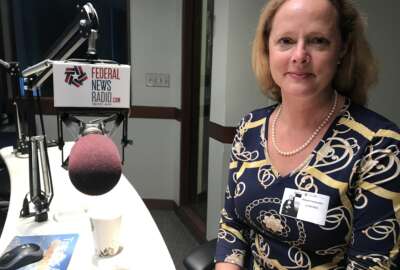
Success: It’s all in the curated data
From math workbooks to computer systems for the top markets in the nation, Accenture Technology's Annette Rippert joined Women of Washington to talk the important...
Best listening experience is on Chrome, Firefox or Safari. Subscribe to Women of Washington’s audio interviews on Apple Podcasts or PodcastOne.
Data is the lifeblood of any agency or consulting firm — but is there a such thing as too much.
On this week’s episode of Women of Washington, Gigi Schumm welcomed Annette Rippert, senior managing director of Accenture Technology. Rippert is responsible for leading a team that helps clients achieve digital transformation using latest emerging technologies across cloud, mobility, analytics, artificial intelligence, security and more. In layman’s terms, her team focuses on helping clients at the intersection of technology and business solve problems through innovation.

As technology develops, agencies and companies alike become more dependent on the data they’ve curated from constituents, for their clients and their own company data. Rippert said one goal of her job is to help their clients — including Oracle, SAP and Amazon, among others — use the data they’ve collected and leverage new technologies to change their own enterprise.
Developing trust is a big component of that.
“You’re not only looking at opportunities to use data, but now you have an obligation. You have a requirement in order to protect that data, be the steward of that data…,” she said. “So that’s become ever increasingly a part of our practice in terms of understanding not only the regulations, but the right ethical things to do with data, the right permissions to seek around the data.”
Data talent pool
The evolution of technology has in many ways outgrown its workforce, and consulting firms — and federal agencies — have had to scrounge for employees with the right skillset.
Data scientists are vital to a successful business, as they focus on analyzing and interpreting data. Information officers too are needed, as they focus on harnessing the data and helping with IT modernization and other digital strategies. But where can they find this talent?
Rippert said Accenture focuses mainly on harnessing talent from universities. Universities have recognized the need for data science skills. Many have programs dedicated to the importance of understanding and analyzing information.
“If we take a look at the importance of data, it’s becoming the next most important resource out there,” she said. “We need to be able to really think about how do we manage that in enterprises, in government, not only for deriving that value, but there’s a lot of data that is problematic because it’s inaccurate, it’s been kept, it’s been uncurated, etc. This is the kind of next frontier and our universities are starting to see that and tailor programs towards it.”
She said the important thing in her job is to make the right decisions for the client, “in their environment, in their industry, for the purpose that they’re trying to adopt that technology.”
Natural progression
Growing up in a suburb of Chicago, Rippert often spent time outside of school with her grandmother. When going down to the country store, she would always buy Rippert math workbooks. Why? Rippert said she loved them.
“Maybe that was a sign very early on … I had this passion for math. I had this passion for science. Even through junior high and in high school, I can remember getting excited walking into my science class to learn something,” she said. “I knew that about myself … that was something I really loved.”
Related Stories

Maintaining the right ecosystem for success
Rippert said she never felt singled out as a woman, even when her classes were filled with mostly men. But she does understand why many women shy away from the STEM fields.
“I know that there are a lot of other experiences. I hear them from other women in my own organization,” she said. “I look at that and try to listen extra carefully, because I think that while it may not be something perceived by you individually, the problem or the circumstance is real in the environment … being aware of that and creating structures around it is pretty important.”
Originally seeing herself in a research role, Rippert realized she needed to be in a career where her research would have an impact. That’s when she gravitated toward the technology field and consulting.
After graduating with her MBA, Rippert started working at the Chicago branch of the consulting firm that would one day become Accenture. Before moving to the Accenture Technology team, Rippert had significant influence over the company’s Federal Services team.
“Our organization was really reorganizing around how we support the federal government and it gave me an opportunity to take what I had learned from a commercial standpoint and really bring it to the notion of the mission here within many of our federal agencies and departments,” she said.
Role models, advice
Rippert was recognized in 2018 by the National Association for Female Executives for her avid support for women in technology. In 2017, she was also honored by Women in Technology.
She said she owes a lot of her dedication to being a role model for young women to the lessons she learned raising five children.
“I felt it was important to create environments where women could have other role models where they could connect with other people who were like them and experiencing similar things early on,” Rippert said. “I felt very passionate about that for a while.”
Rippert said it’s also important to encourage young girls to pursue STEM from an early age. Accenture Technology supports education programs in schools, she said.
Finding your career path isn’t always as linear as Rippert’s, though. Success is made up of your trial and error moments, as well as your triumphs. It’s all in the data you curate from your choices, your goals and your education.
It’s also important not to be too hard on yourself, she said.
“Sometimes it’s okay to let life happen … If you make a mistake, it was a step on a path towards something that will take you to a better place. Pay more attention to learn about yourself,” Rippert said. “[Doing] what you like to do will make you so much happier about the career that you’ve chosen. And believe in your own self-resilience.”
Copyright © 2025 Federal News Network. All rights reserved. This website is not intended for users located within the European Economic Area.
Steff Thomas is a digital editor at Federal News Network.






